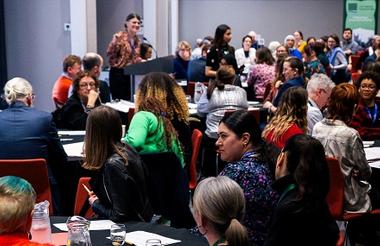A lot can change in 30 years. The three decades since we started funding London’s civil society has seen a radical shift – shaped by pivotal moments such as the financial crash, the pandemic and the more recent cost-of-living crisis.
When we awarded our first grant in September 1995 – £18,000 to a deaf health charity for a new minibus – we were taking a journey into the unknown, moving beyond our historic remit of the past 900 years – the maintenance of five of London’s bridges.
Since then, we’ve become London’s biggest independent charitable funder, awarding over £840m for everything from city farms to social activities for older people to projects supporting young people’s confidence and career prospects.
In the last five years alone, we made an extra £200m available to support charities battling the impact of the pandemic and cost-of-living crisis.
That funding is now drawing down which, together with the soaring demand for grants across the sector, means we simply can’t continue to fund in the way we have in the past.
Our new funding policy, Standing with Londoners, sees us position ourselves firmly as a social justice funder. The policy, and its first programme, Access to Justice – due to launch next month – have been shaped following extensive collaboration with the sector, and drawing on our experience of what we’ve learned over the last 30 years.
Collaboration is key
During the pandemic, we contributed to the London Community Response, a cross-sector collaboration in which 67 funders distributed more than £57m in over 3,300 grants.
By pooling our resources in an unprecedented way, the sector was able to provide vital support, via a single application portal, to charities battling the twin pressures of soaring demand and plummeting income.
Working collaboratively with organisations tackling the root causes of inequality and injustice is a key lesson from that time. It continues to inform our approach and will be fundamental to our work under the new policy.
Another lesson we drew from the Covid response was the power of prioritising funding for groups led by and for marginalised communities, in this case to those disproportionately affected by the pandemic.
The fact is, for all its strengths as a great global city, London remains a deeply unequal place. A one size fits all approach doesn’t work, and addressing these inequalities means focusing funding on communities that have been marginalised and empowering organisations to work collectively to change the systems which perpetuate injustice, rather than simply applying a sticking plaster.
Key to the success of this approach is working with communities to codesign programmes which address their needs, and with equity partners who can interpret data, shape criteria and ensure from the beginning to the end of the process, we are as inclusive as possible. It’s a far cry from the top-down approach to funding which was the norm 30 years ago.
Trust the sector
One message we have received loud and clear is that charities are crying out for long-term core or flexible funding to enable them to best navigate the challenges they face.
While multi-year funding has long been a staple of our portfolio, in recent years we’ve seen a shift away from project funding to core funding and in the future this approach will be the rule, not the exception.
Charities know what they’re doing. They know the needs of the communities they serve and the best way to use their resources to achieve their aims.
By offering more flexibility, we give organisations time and space to achieve long-term, strategic outcomes; and the freedom to change how they use our funding in response to emerging needs.
How we fund is as important as what we fund. We have committed to making our processes more streamlined and flexible, stripping out the red tape which can be daunting, in particular for smaller charities.
Under our new policy, potential applicants will have the option of a pre-application call to help determine if they may be eligible and, if not, to avoid wasting time on an application unlikely to succeed. Further improvements to our processes will be tested when we launch our first new funding programme, and learning from this will inform future rounds.
We will continue to support all our funded organisations, of which we currently have around 1,500, through our funder plus scheme, offering free non-financial support designed to help them grow and achieve lasting impact.
In a time of uncertainty in the sector and a significant shift in our role as a funder, we commit to being as transparent and open with potential applicants as we can be.
If we’ve learned anything in 30 years it’s that, much as we’d like to, we can’t fund everything. We can, however, target our limited resources where they will have the greatest impact and work hard to be the best funder we can be for the benefit of London and Londoners.
Related articles











